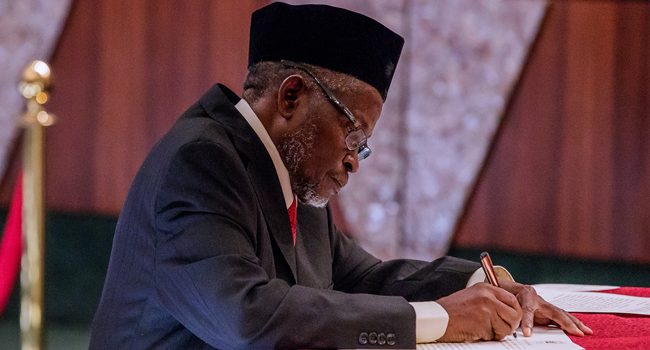 |
| New CJN Justice Ibrahim Tanko Mohammed |
The acting Chief Justice of Nigeria, Justice Ibrahim Muhammad Tanko, has urged Judges to handle election petitions without any external pressure or influence either from political parties, stakeholders or economic interest groups.
Tanko, represented by the President of the Court of Appeal, Justice Zainab Bulkachuwa, made the call at the “2019 Workshop on Election Petitions for Justices and Judges’’, held on Monday in Abuja.
He said at the workshop that was organised by the Independent National Electoral Commission that it was important that the judiciary maintained absolute independence.
“Judges should handle election petitions without any external pressure or influence either by political parties, stakeholders or economic interest groups.
“The Judiciary must continue to take steps to ensure that it is not seen as being partisan but must always demonstrate manifest integrity in its adjudicatory processes.
“Consequently, Judicial Officers serving on election petition tribunals, must note that Judgments must not be ambiguous and should be devoid of any form of external influence.
“Your Lordships should shun unnecessary associations with lawyers who may be acting as conduits for politicians, no matter how innocent they may be portrayed.
“You must guard your integrity and the integrity of the Judiciary, by avoiding acts that will bring you under the disciplinary jurisdiction of the National Judicial Council.
“The NJC will not hesitate to wield the big stick sanctions to any judicial officer who is found wanting in the discharge of his duties,’’ he said.
INEC Chairman, Prof. Mahmood Yakubu, who was represented by National Commissioner, Mrs May Abamuche-Mbu, expressed concern over issue of conflicting judgments arising from pre-election and post-election cases.
Yakubu said that conflicting judgments, especially by courts of co-ordinate jurisdiction at the High Court level, were putting the commission in a very difficult position and creating uncertainty in the process.
“Conflicting court orders are negatively affecting the consistency, neutrality, and public perception, not only of the Commission, but the Judiciary as well.
“There is, therefore, the urgent need to address the issue of conflicting judgments in order to engender certainty in the electoral process.
“Our second area of concern relates to the lack of consequential Orders by the Courts after making findings on an issue and stating the position.
“In such cases, the commission is compelled to take a position relying on previous decisions of the Court on the subject.
“This as in some cases made the commission appear inconsistent and has also led to protracted litigation,’’ Yakubu said.
He said that the workshop was important as it would afford INEC a platform to further record its concerns about the adjudication of electoral disputes as the country approached the General Elections.
“Secondly, to receive feedback from the sector that has reviewed our activities over the years with respect to the areas we need to do more to facilitate the speedy and qualitative administration of justice,’’ he said.(NAN)
Tanko, represented by the President of the Court of Appeal, Justice Zainab Bulkachuwa, made the call at the “2019 Workshop on Election Petitions for Justices and Judges’’, held on Monday in Abuja.
He said at the workshop that was organised by the Independent National Electoral Commission that it was important that the judiciary maintained absolute independence.
“Judges should handle election petitions without any external pressure or influence either by political parties, stakeholders or economic interest groups.
“The Judiciary must continue to take steps to ensure that it is not seen as being partisan but must always demonstrate manifest integrity in its adjudicatory processes.
“Consequently, Judicial Officers serving on election petition tribunals, must note that Judgments must not be ambiguous and should be devoid of any form of external influence.
“Your Lordships should shun unnecessary associations with lawyers who may be acting as conduits for politicians, no matter how innocent they may be portrayed.
“You must guard your integrity and the integrity of the Judiciary, by avoiding acts that will bring you under the disciplinary jurisdiction of the National Judicial Council.
“The NJC will not hesitate to wield the big stick sanctions to any judicial officer who is found wanting in the discharge of his duties,’’ he said.
INEC Chairman, Prof. Mahmood Yakubu, who was represented by National Commissioner, Mrs May Abamuche-Mbu, expressed concern over issue of conflicting judgments arising from pre-election and post-election cases.
Yakubu said that conflicting judgments, especially by courts of co-ordinate jurisdiction at the High Court level, were putting the commission in a very difficult position and creating uncertainty in the process.
“Conflicting court orders are negatively affecting the consistency, neutrality, and public perception, not only of the Commission, but the Judiciary as well.
“There is, therefore, the urgent need to address the issue of conflicting judgments in order to engender certainty in the electoral process.
“Our second area of concern relates to the lack of consequential Orders by the Courts after making findings on an issue and stating the position.
“In such cases, the commission is compelled to take a position relying on previous decisions of the Court on the subject.
“This as in some cases made the commission appear inconsistent and has also led to protracted litigation,’’ Yakubu said.
He said that the workshop was important as it would afford INEC a platform to further record its concerns about the adjudication of electoral disputes as the country approached the General Elections.
“Secondly, to receive feedback from the sector that has reviewed our activities over the years with respect to the areas we need to do more to facilitate the speedy and qualitative administration of justice,’’ he said.(NAN)
In this article:
